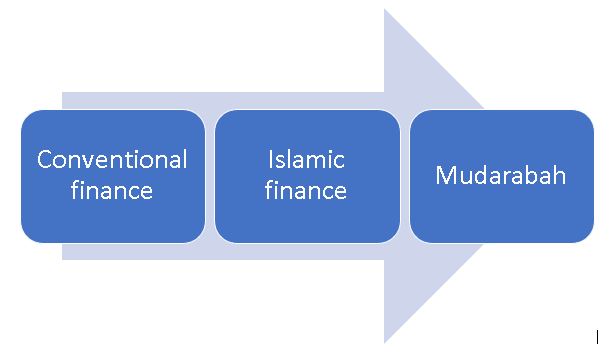Comparative Analysis Of Conventional Finance Products And Non-Interest Finance Products In Nigeria
A Conceptual Analysis
Abstract
The emergence of Islamic Financial System (IFS) in Nigeria has generated many questions with respect to its similarities and differences with conventional finance banking system products. There were also agitations on its modes of operations, especially with a view to ascertain its purpose and whether it deviates significantly from conventional financial system. This study was conducted to look into the issues of contemporary relevance to Islamic finance products in Nigeria. It began with examination of scriptural evidences in the Bible, Qur’an and the Torah that outlaw usury. It also x-rays the similarities and differences between both Islamic and conventional financial system products. The study notes practice of IFS and its products is widespread except for its imposition of restriction on morally repugnant transactions. The study recommends its acceptance by business including individuals as well as the government in order to bring the sustainable development goals closer to realization.
Downloads
References
Adedapo, A.A., Abubakar, T., Ladan, S., Jadah, H.M., Yuqoot, E.S., Isah, S.G., Remi, S.M. (2014). Bai Salam In The Light of Contemporary Application: Issues, Challenges and Recommendation. Proceedings of Islamic Business Management Conference (IBMC), 152-158.
Adeola, H. (2009). Islamic Finance : The Answer to Financial. Inclusion in Nigeria. A Presentation at Efina Conference1–25.
Adua, S. S. (2019). Historical background of Islamic banking in Nigeria.International Journal of Humanities and Social Sciences8(1), 67–74.
Ahmad, A., Rehman, K &Saif, M.I. (2010). Islamic banking experience of Pakistan: Comparison of Islamic and conventional banks. International Journal of Business Management. 5(2).
Akinsulire, O. (2014). Financial Management (special ed.). Mushin, Lagos: El-Toda Ventures Limited.
Akkizidis, I. & Khandelwal, S. (2008). Financial Risk Management for Islamic Banking and Finance. Palgarave Macmillan.
Alswaidan, M. W. (2017). An investigation of sukuk structure risk. Unpublished Phd Dissertation submitted to Depertment of Economic and Finance Unversity of Portsmouth, England.
Baber, H. (2018). How crisis-proof is Islamic finance ? A comparative study of Islamic finance and conventional finance during and post financial crisis. https://doi.org/10.1108/QRFM-12-2017-0123.
Cerovic, L. Nakolaj, S.S. & Maradin, D. (2017). Comparative Analysis Of Conventional and Islamic Banking : Importance of Market Regulation. 241–264.
Felix, C.O. (2018). Nigeria: Islamic Finance in Nigeria. Available at www.mondaq.com/Nigeria/x/757434/islamic+Finance+in+Nigeria
Hanif, M. (2011). Differences and Similarities in Islamic and Conventional Banking.International Journal of Business and Social Science,2(2).
Humoud, A. (2010) A Comparison between Islamic and Conventional Home Financing in Kuwait: Client Perceptions of the Facilities offered by The National Bank of Kuwait and Kuwait Finance House. Doctoral Thesis, DurhamUniversity. Available at Durham e-theses online: Http://etheses.dur.ac.uk/543/
Investment and Finance (n.d). Difference between Conventional Leasing and Islamic Leasing (Ijarah). Available at https://www.investment-and-finance.net/islamic-finance/tutorials/difference-between-conventional-leasing-and-islamic-leasing-ijarah (access on 15/08/2019)
Iqbal, M., and Molyneux, P. (2005). Thirty Years of Islamic Banking: History, Performance and Prospects.Houndmills and New York: Palgrave Macmillan.
Istisna (n.d). Istisna as a mode of finance. avaliable at https://islamicmarkets.com/education/istisna-as-a-mode-of-finance
Kapetanovic, H. (2017).Islamic finance and economic development the Case of Dubai.A Phd Thesis submitted to Department of Middle Eastern Studies Faculty of Social Science and Public Policy King’s College London.
Kiong, S. (2014). Islamic Finance in the Global Economy : An Exploration of Risk Management and Governance within Shariah Finance.
Lewis, M. & Algaoud, L.M. (2001).Islamic Banking. Cheltenham: Edward Elgar
Olawoyin, O. (2019). What Islamic finance products can do to Nigeria’s capital market, infrastructural growth. available at https://www.premiumtimesng.com/news/headlines/343381-what-islamic-finance-products-can-do-to-nigerias-capital-market-infrastructural-growth.html
Sabri, M. (2014), Liquidity Creation and Liquidity Risk Exposures in the Banking Sector: A Comparative Exploration between Islamic, Conventional and Hybrid Banks in the Gulf Corporation Council Region. Durham theses, Durham University. Available at Durham e-theses Online: http://etheses.dur.ac.uk/10890/
Saidu K.S., Junaidu, A.S.&Jibril R.S. (2018). Financial Instruments: Islamic Versus Conventional. Accounting from a Cross-Cultural Perspective.
Siddiqi, M. N. (1983). Issues in Islamic Banking. The Islamic Foundation, UK.
Shalhoob, H.S. (2016).A comparative analysis of risk-return characteristics between Sukuk (Islamic bonds) and conventional bonds. Robert Gordon University, PhD thesis. Held on Open AIR [online]. Available from: https://openair.rgu.ac.uk
Standing Committee for Economic and Commercial Cooperation of the Organization of Islamic Cooperation (COMCEC) (2017:35). Diversification of Islamic Financial Instruments.
Tameme, M.E.M (2009). Demand and Supply Conditions of Islamic Housing Finance in United Kingdom: Perceptions of Muslims Clients. (Unpublished) Doctoral Degree of Philosophy thesis submited to University of Durham.
Umer, R.M. (2013) Exploring Legal, Regulatory and Shari`ah Compliance Issues inIslamic Financial Instruments: Derivatives and Sukuk. Durham theses, Durham University. Available at Durham e-theses Online: http://etheses.dur.ac.uk/7349/

Copyright (c) 2021 INTERNATIONAL JOURNAL OF ECONOMICS, BUSINESS AND HUMAN BEHAVIOUR

This work is licensed under a Creative Commons Attribution-NonCommercial 4.0 International License.











